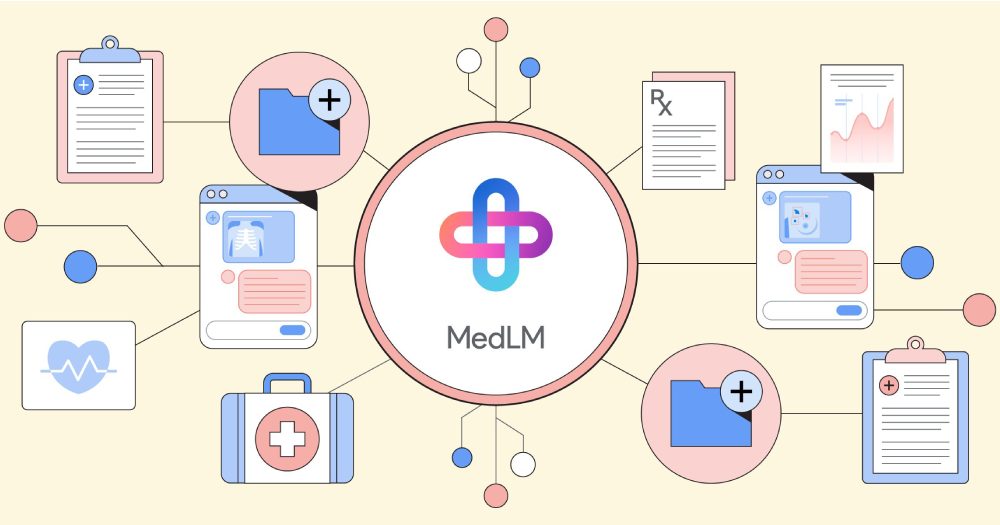Google launches Generative AI models called MedLM for healthcare

The other day - Google announced MedLM, a family of foundation models fine-tuned for healthcare industry use cases. MedLM is now available to Google Cloud customers in the United States through an allow-listed general availability in the Vertex AI platform. MedLM is also currently available in preview in certain other markets worldwide.
Two models
There are two models under MedLM, built on Med-PaLM 2, to offer flexibility to healthcare organizations and their different needs. Google said it learned about these needs by piloting its tools with different organizations.
The first MedLM model is larger, designed for complex tasks. The second is a medium model, which is able to be fine-tuned and is best for scaling across tasks. The development of these models has been informed by specific healthcare and life sciences customer needs, such as answering a healthcare provider's medical questions and drafting summaries. In the coming months, we're planning to bring Gemini-based models into the MedLM suite to offer even more capabilities.
Already in use
Many of the companies Google has been testing MedLM with are now moving it into production in their solutions or broadening their testing. Here are some examples:
- Augmedix: For the past several months, HCA Healthcare has been piloting a solution to help physicians with their medical notes in four emergency department hospital sites. Physicians use an Augmedix app on a hands-free device to create accurate and timely medical notes from clinician-patient conversations in accordance with the Health Insurance Portability and Accountability Act (HIPAA). Augmedix's platform uses natural language processing, along with Google Cloud's MedLM on Vertex AI, to instantly convert data into drafts of medical notes, which physicians then review and finalize before they're transferred in real time to the hospital's electronic health record (EHR).
- BenchSci: BenchSci is bringing AI to scientific discovery to help expedite drug development, and it is integrating MedLM into its ASCEND platform to further improve the speed and quality of pre-clinical research and development. Said platform is an AI-powered evidence engine that produces a high-fidelity knowledge graph of more than 100 million experiments, decoded from hundreds of different data sources. This allows scientists to understand complex connections in biological research, presenting a thorough grasp of empirically validated and ontologically derived relationships, including biomarkers, detailed biological pathways, and interconnections among diseases. The integration of MedLM works to further enhance the accuracy, precision and reliability, and together with ASCEND's proprietary technology and data sets - it aims to significantly boost the identification, classification, ranking, and discovery of novel biomarkers.
- Accenture: Aimed at healthcare process improvement, Accenture's Solutions.AI for Processing for Health interprets structured and unstructured data from multiple sources to automate manual processes that were previously time-consuming and prone to error, like reading clinical documents, enrollment, claims processing, and more. This helps clinicians make faster, more informed decisions and frees up more time and resources for patient care. Using Google Cloud's Claims Acceleration Suite, MedLM, and Accenture's Solutions.AI for Processing, new insights can be uncovered - ultimately leading to better patient outcomes.
- Deloitte: Deloitte, Google Cloud, and healthcare leaders are piloting MedLM's capabilities to make it easier for care teams to discover information from provider directories and benefits documents. These inputs will then help contact center agents better identify best-fit providers for members based on plan, condition, medication and even prior appointment history, getting people faster access to the precise care they need.
The context
Google concludes its announcement by mentioning the successes it had in the generative AI space for healthcare — from building the first LLM to obtain a passing score (>60%) on U.S. medical-licensing-exam-style questions (published in Nature), to advancing it to obtain an expert level score (86.5%), to applying it in real-world scenarios through a measured approach.
Alas, it is not the only game in town, with Microsoft and Amazon going for the same market. Recently, Amazon launched AWS HealthScribe, which uses generative AI to transcribe, summarize, and analyze notes from patient-doctor conversations — while Microsoft is playing with various AI-powered healthcare products, including medical "assistant" apps underpinned by large language models.
So the race is on, and we'll see who gets to score more clients in 2024.
💡Did you know?
You can take your DHArab experience to the next level with our Premium Membership.👉 Click here to learn more
🛠️Featured tool
 Easy-Peasy
Easy-Peasy
An all-in-one AI tool offering the ability to build no-code AI Bots, create articles & social media posts, convert text into natural speech in 40+ languages, create and edit images, generate videos, and more.
👉 Click here to learn more


